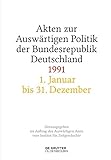Akten zur Auswärtigen Politik der Bundesrepublik Deutschland : Wissenschaftliche Leiterin: Ilse Dorothee Pautsch. Akten zur Auswärtigen Politik der Bundesrepublik Deutschland 1991 / hrsg. von Matthias Peter, Christoph Johannes Franzen, Tim Szatkowski, Andreas Wirsching, Stefan Creuzberger, Hélène Miard-Delacroix.
Material type: TextSeries: Akten zur Auswärtigen Politik der Bundesrepublik DeutschlandPublisher: München ; Wien : De Gruyter Oldenbourg, [2022]Copyright date: ©2022Description: 1 online resource (XCVI, 1906 p.)Content type:
TextSeries: Akten zur Auswärtigen Politik der Bundesrepublik DeutschlandPublisher: München ; Wien : De Gruyter Oldenbourg, [2022]Copyright date: ©2022Description: 1 online resource (XCVI, 1906 p.)Content type: - 9783110762150
- 9783110762242
- 9783110762204
- online - DeGruyter
- Issued also in print.
| Item type | Current library | Call number | URL | Status | Notes | Barcode | |
|---|---|---|---|---|---|---|---|
 eBook
eBook
|
Biblioteca "Angelicum" Pont. Univ. S.Tommaso d'Aquino Nuvola online | online - DeGruyter (Browse shelf(Opens below)) | Online access | Not for loan (Accesso limitato) | Accesso per gli utenti autorizzati / Access for authorized users | (dgr)9783110762204 |
Browsing Biblioteca "Angelicum" Pont. Univ. S.Tommaso d'Aquino shelves, Shelving location: Nuvola online Close shelf browser (Hides shelf browser)
Frontmatter -- Inhalt -- Vorwort -- Deutsche Außenpolitik im Jahre 1991: Eine Einführung -- Vorbemerkungen zur Edition -- Verzeichnisse -- Dokumente -- Band I (Dokumente 1–214). Part 1 -- Band I (Dokumente 1–214). Part 2 -- Band I (Dokumente 1–214). Part 3 -- Band II (Dokumente 215–448). Part 1 -- Band II (Dokumente 215–448). Part 2 -- Band II (Dokumente 215–448). Part 3 -- Band II (Dokumente 215–448). Part 4 -- Register -- Verzeichnis der Personen im Geschäftsbereich des Auswärtigen Amts -- Personenregister -- Sachregister
restricted access online access with authorization star
http://purl.org/coar/access_right/c_16ec
What was the world supposed to look like after the end of the Cold War? In German foreign policy, the focus was on shaping Europe with the Treaty of Maastricht and establishing a security system that would preserve the balance of Germany’s relationship with the crumbling USSR and the states in Central and Eastern Europe. The Golf War and attempts to prevent the Yugoslav conflict presented further challenges.
Wie sollte die Welt nach dem Ende des Kalten Kriegs aussehen? Im Zentrum standen für die deutsche Außenpolitik die Ausgestaltung Europas durch den Vertrag von Maastricht und ein Sicherheitssystem, das auch die Balance im Verhältnis zur zerfallenden UdSSR und den Staaten Mittel- und Osteuropas wahren sollte. Weitere Herausforderungen ergaben sich aus dem Golfkrieg und den Versuchen zur Eindämmung des Jugoslawienkonflikts.
Issued also in print.
Mode of access: Internet via World Wide Web.
In German.
Description based on online resource; title from PDF title page (publisher's Web site, viewed 02. Mai 2023)









